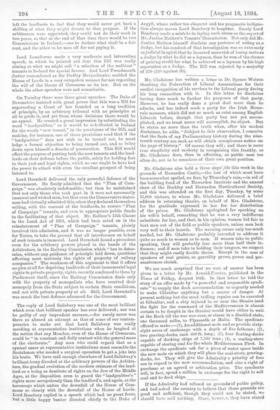The reply of Lord Salisbury was one of the most
brilliant which even that brilliant speaker has ever delivered ; nor was he guilty of any imprudent sarcasm,—for surely never was there so absurd an attempt as that of some of our contem- poraries to make out that Lord Salisbury was really mocking at representative institutions when he laughed at the notion that any Member, even of the House of Commons, could be "in constant and daily contact with the general mass of the electorate." Any man who could regard that as a cynical sneer at representative institutions must resemble the Scotchman who needed a surgical operation to get a joke into his brain. We have said enough elsewhere of Lord Salisbury's brilliant irony directed at the arbitrary powers of the Arbitra- tors, the gradual evolution of the modern estimate of the land- lord as a being as destitute of rights as the Jew of the Middle Ages, at the disposition even to guard the " landgrabber's" rights more scrupulously than the landlord's, and again, at the horoscope which unites the downfall of the House of Com- mons so closely with the downfall of the House of Lords. Lord Rosebery replied in a speeoh which had no great force, but a little happy banter directed chiefly to the Duke of Argyll, whose rather too eloquent and too pragmatic indigna- tion always moves Lord Rosebery to laughter. Surely Lord Rosebery made a mistake in laying such stress on the report of Mr. Justice Mathew's Tenants' Commission. Not only did Mr. Justice Mathew himself disclaim any pretence of acting as a• Judge, but his conduct of that investigation was so extremely unjudicial in spirit that he incurred more risk of losing caste as• a Judge by what be did as a layman, than he won of the chance of gaining credit for what be achieved as a layman by his high reputation as a Judge. The Bill was rejected by a majority of 219 (249 against 30).


































 Previous page
Previous page